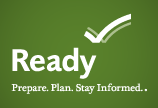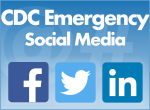Prevent Illness After a Disaster
Highlights
- Clean up, disinfect, and practice good hygiene to avoid illness from bacteria, viruses, mold, and mildew.
- Get medical care if you are injured, sick, or having trouble coping with stress.
- To prevent carbon monoxide poisoning, only use generators, pressure washers, grills, camp stoves, or other gasoline, propane, natural gas, or charcoal-burning devices outside and away from open windows, doors, and air vents.
- Stay cool and drink plenty of fluids to prevent heat-related illness.
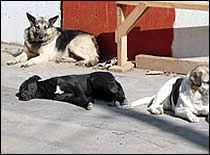
Protect Yourself from Animal- and Insect-Related Hazards
- Avoid wild or stray animals and biting or stinging insects.
- Call local authorities to handle animals.
- Get rid of dead animals, according to local guidelines, as soon as you can.
- For more information, contact your local animal shelter or services, a veterinarian, or the Humane Society for advice on dealing with pets or stray or wild animals after an emergency.
For information on specific animal and insect issues, see Protect Yourself from Animal- and Insect-Related Hazards After a Natural Disaster.
Prevent Carbon Monoxide Poisoning
- Carbon monoxide (CO) is an odorless, colorless gas that can cause sudden illness and death if you breathe it. Never use generators, pressure washers, grills, camp stoves, or other gasoline, propane, natural gas, or charcoal-burning devices inside your home, basement, garage, or camper—or even outside near an open window, door, or vent.
- Don’t heat your house with a gas oven.
- If you are too hot or too cold, or you need to prepare food, don’t put yourself and your family at risk for CO poisoning—look to friends, family, or a community shelter for help.
- If your CO detector sounds, leave your home immediately and call 911.
- Seek prompt medical attention if you suspect CO poisoning and are feeling dizzy, light-headed, or nauseated.
For further guidance on avoiding CO poisoning, see Protect Yourself from Carbon Monoxide Poisoning After an Emergency.
Top of PageClean Up Safely After Floods
- To prevent illness, disinfect and dry buildings and items in them. This will prevent growth of some bacteria, viruses, mold, and mildew that can cause illness.
For more information, see Flood Water After a Disaster or Emergency.
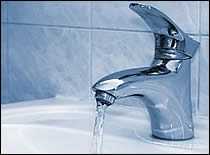
Keep Food and Drinking Water Safe
- Food may not be safe to eat during and after an emergency. Water may not be safe for cooking.
- Water may not be safe to drink, clean with, or bathe in after an emergency, such as a hurricane or flood. During and after a disaster, water can become contaminated with microorganisms (for example, bacteria), sewage, agricultural or industrial waste, chemicals, and other substances that can cause illness or death.
- Listen to and follow public announcements. Local authorities will tell you if water is safe to drink or to use for cooking or bathing. Follow local instructions to use bottled water or to boil or disinfect water for cooking, cleaning, or bathing.
For more information, see Keep Food and Water Safe after a Natural Disaster or Power Outage and Food & Water Safety and Hand Hygiene Resources.
Top of Page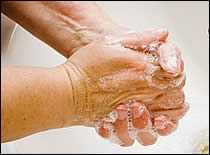
Wash Your Hands
- Always wash your hands with soap and boiled or disinfected water before preparing or eating food, after toilet use, after participating in cleanup activities, and after handling articles contaminated by floodwater or sewage. Use warm water when available. Wash children’s hands frequently (always before meals).
- Disinfect water for washing by mixing 1/8 teaspoon of household bleach per 1 gallon of water). Let it stand for 30 minutes. If the water is cloudy, use a solution of 1/4 teaspoon of household bleach per 1 gallon of water.
- If water isn’t available, use alcohol-based products made for washing hands.
For more tips on washing your hands, see Clean Hands Save Lives: Emergency Situations and Food & Water Safety and Hand Hygiene Resources.
Infectious Disease
Short bouts of diarrhea and upset stomach and colds or other breathing diseases sometimes occur in developed countries, such as the United States, after a natural disaster, particularly among large groups of people in a shelter. Basic hygiene measures like frequent hand washing or use of an alcohol hand gel, especially after using the restroom or changing diapers and before eating, can help prevent these diseases.
Diseases like cholera or typhoid are rare in developed countries and do not typically occur after a natural disaster.
For information on infectious disease, see Infectious Disease After a Disaster.
Immunizations
For information on immunizations for evacuees, relief workers, emergency responders and travelers, see Immunization After a Natural Disaster.
Top of PageProtect Mental Health
- The days and weeks after an emergency are going to be rough. Some sleeplessness, anxiety, anger, hyperactivity, mild depression, or lethargy are normal and may go away with time. If you feel any of these symptoms acutely, seek counseling. Your state, local, tribal health departments will help you find local resources, including hospitals or health care providers that you may need.
- Seek medical care if you are injured, feel sick, or have acute stress and anxiety.
- Keep as many elements of your normal routine incorporated into the disaster plans as possible, including activities to calm children’s fears.
- Be aware that you may have fewer resources to attend to your day-to-day conflicts, so it is best to resolve what you can ahead of time.
- Turn to family, friends, and important social or religious contacts to setup support networks to deal with the potential stressors.
- Let your child know that it is okay to feel upset when something bad or scary happens. Encourage your child to express feelings and thoughts, without making judgments.
For additional resources, see
Coping With a Disaster or Traumatic Event.
Monitor your radio or television for up-to-date emergency information.
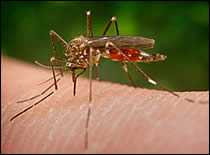
Avoid Mosquitoes
- Rain and flooding in a hurricane area may lead to an increase in mosquitoes, which can carry diseases like West Nile virus. In most cases, the mosquitoes will be pests but will not carry communicable diseases.
- To protect yourself from mosquitoes, use screens on dwellings, and wear long pants, socks, and long-sleeved shirts and use insect repellents that contain DEET or Picaridin. Care must be taken when using DEET on small children. More information about these and other recommended repellents can be found in the fact sheet Updated Information Regarding Insect Repellents.
- To control mosquito populations, drain all standing water left in open containers, such as flower pots, tires, pet dishes, or buckets, outside your home.
Monitor your radio or television for up-to-date emergency information.
Top of PagePrevent Illness from Sewage
- If there is flooding along with a hurricane, the waters may contain fecal material from overflowing sewage systems and agricultural and industrial waste. Although skin contact with floodwater does not, by itself, pose a serious health risk, there is risk of disease from eating or drinking anything contaminated with floodwater.
- If there has been a backflow of sewage into your house, wear rubber boots and waterproof gloves during cleanup. Remove and discard contaminated household materials that cannot be disinfected, such as wall coverings, cloth, rugs, and drywall.
- If you have any open cuts or sores that will be exposed to floodwater, keep them as clean as possible by washing them with soap and applying an antibiotic ointment to discourage infection.
- Wash clothes contaminated with flood or sewage water in hot water and detergent and separately from uncontaminated clothes and linens.
- Do not allow children to play in floodwater areas and do not allow children to play with floodwater-contaminated toys that have not been disinfected. Disinfect toys by using a solution of one cup of bleach in five gallons of water. Some toys, such as stuffed animals and baby toys, cannot be disinfected; they should be discarded.
Monitor your radio or television for up-to-date emergency information.
Prevent Temperature-Related Illness
- When standing or working in water that is cooler than 75°F (24°C):
- Wear rubber boots.
- Ensure that clothing and boots have adequate insulation.
- Take frequent breaks out of the water.
- Change into dry clothing when possible.
- Prevent heat–related illness:
- Stay in air-conditioned buildings.
- Take breaks in shaded areas or in cool rooms.
- Drink water and nonalcoholic fluids often.
- Wear lightweight, light-colored, loose-fitting clothing.
- Do outdoor activities during cooler hours.
For further guidance, visit the CDC Extreme Heat website.
Monitor your radio or television for up-to-date emergency information.
Top of Page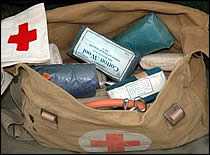
Prevent or Treat Wounds
- Immediately clean out all open wounds and cuts with soap and clean water. Keep wounds covered with clean, dry bandages that are large enough to cover the wound and contain any pus or drainage. Change bandages as needed and when drainage can be seen through the bandage. Contact a doctor to find out whether more treatment is needed (such as a tetanus shot). If a wound gets red, swells, or drains, seek immediate medical attention.
- Avoid wild or stray animals. If you are bitten by any animal, seek immediate medical attention. If you are bitten by a snake, try to identify it, so that if it is poisonous, you can be given the correct anti-venom. Do not cut the wound or attempt to suck the venom out. (See also the CDC Rabies website, Rat-Bite Fever: Frequently Asked Questions, and Medical Problems and Treatment Considerations for the Red Imported Fire Ant [2 MB, 9 Pages].)
- If your skin or eyes may have come in contact with hazardous materials, such as acid from a car battery, wash thoroughly with decontaminated water and seek medical attention as needed.
- If you have wounds, you should be evaluated for a tetanus immunization, just as you would at any other time of injury. If you receive a puncture wound or a wound contaminated with feces, soil, or saliva, have a doctor or health department determine whether a tetanus booster is necessary based on individual records.
For further guidance, see Emergency Wound Care After a Natural Disaster.
Monitor your radio or television for up-to-date emergency information.
Top of Page- Page last reviewed: September 25, 2017
- Page last updated: October 4, 2017
- Content source:


 ShareCompartir
ShareCompartir
